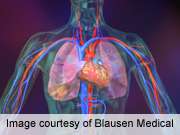Varying radiation exposure in cath lab procedures analyzed

(HealthDay)—Endovascular peripheral procedures are associated with higher radiation exposure for catheterization laboratory operators than coronary procedures, according to a study published in the October issue of JACC: Cardiovascular Interventions.
Maja Ingwersen, D.V.M., from the University Cardiovascular Center in Hamburg, Germany, and colleagues measured radiation doses of three operators using real-time dosimetry for the body, neck, and hand during 284 procedures in 281 patients over a 14-week period. Mixed models were used to enable comparisons between procedures.
The researchers found that there were independent associations for the type of procedure, the patient's body mass index, and the fluoroscopy time with the operator's radiation exposure. Operators were exposed to a mean effective dose (E) of 2.2 µSv per procedure. E was 2.3-fold higher in pelvic procedures (P < 0.001); 1.7-fold higher in upper limb procedures (P < 0.001); and 1.4-fold higher in below-the-knee procedures (P = 0.023) than in coronary angiography procedures. Eye doses (mean, 19.1 µSv) were significantly higher in peripheral versus coronary angiography procedures. Hand doses (mean, 99.6 µSv) were significantly higher in pelvic procedures, compared with coronary angiography, upper limb, and below-the-knee procedures.
"Endovascular procedures for pelvic, upper limb, and below-the-knee disease are accompanied with a higher radiation exposure of the operator than with coronary procedures," the authors write.
One author is an employee of Philips Healthcare; Philips provided the DoseAware system used in the study.
More information:
Abstract
Full Text (subscription or payment may be required)
Copyright © 2013 HealthDay. All rights reserved.

















